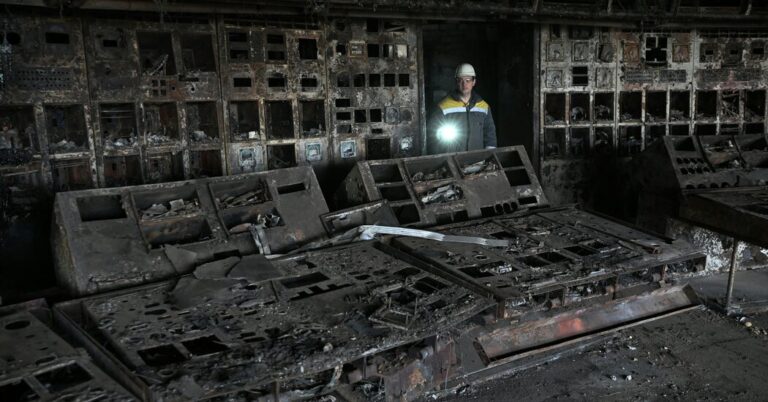As Ukraine struggles to hold back Russian advances, the country’s officials say they are once again facing the formidable challenge of keeping electricity flowing as Moscow’s forces increasingly strike power plants.
To conserve energy, the government has ordered nationwide rolling blackouts for Monday night, broadening the smaller regional ones that have become the norm in recent weeks.
“This is another frontline in the war,” said Maxim Timchenko, the head of DTEK, Ukraine’s largest private electricity company, on social media last week. He said the company’s workers were engaged in a “race against time” to restore power to consumers.
The nationwide blackout, scheduled from 6 p.m. to midnight, will affect the entire country for the first time this year, but it is unclear if it will continue past Monday.
The winter of 2022-2023 was especially hard on Ukrainians after Russian forces struck many power plants, leaving much of the population without heat in the bitter cold. But after that, Ukrainian forces became more adept at shooting down incoming missiles and had more weapons at their disposal to do so. At least until this spring.
As Ukrainian troops run low on weaponry, especially after the United States slowed down deliveries of arms, they have been less able to protect themselves against Russian barrages that have also become more sophisticated.
Stepped-up attacks by Russia are raising fears that power cuts will not only affect consumers, but that they will also hurt Ukraine’s defense industry when it is most needed.
“It definitely slows down the production and it becomes more expensive,” said Oleksandr Dmitriyev, who coordinates efforts to supply the military with weapons and other equipment. “It is easier for civilians to survive without electricity but for military production during the war it is critically important to have it.”
Besides imposing blackouts, Ukraine is asking for assistance from its Western partners, requesting power grid equipment and emergency electricity imports. On Sunday, Ukraine imported power from Romania, Slovakia, Poland, Hungary, and Moldova.
DTEK has also started a campaign asking countries to give Ukraine used equipment that they no longer need.
“To buy or order the production of new equipment quickly is impossible,” said Pavlo Bilodid, a spokesman for the company. “The only way is to get used equipment from countries that don’t need it anymore, and only their political will is needed for that.”
The electricity equipment that is possible to use in Ukraine is in the post-Soviet countries of Eastern Europe. Many of them have already started working on donating it.
The Ukrainian boxer Oleksandr Usyk, who became the undisputed world heavyweight champion on Sunday, also joined the campaign and recorded a video wearing a T-shirt with the words “the fight for light.”
“These attacks are directed against people,” Mr. Usyk said in the video.
Ukraine is also requesting more air defense systems, especially the U.S.-made Patriot system, both to protect its electricity grid and to help it resist the Russian offensive in the northeastern Kharkiv region that started 10 days ago. Deep State, a group that analyzes combat footage and has close links to the Ukrainian army, said on Sunday that Russian forces had advanced in 10 different locations in Ukraine’s east and south, but had not captured any new villages.
“Two Patriots for the Kharkiv region could significantly help in protecting lives from Russian terror,” President Volodymyr Zelensky said last week during his meeting with Secretary of State Antony J. Blinken.
Mr. Zelensky has also urged Ukrainians and businesses to consume electricity responsibly. “We need to ensure that the public is fully informed about how power cuts happen now, when there is a peak load, and why we need everyone to be conscious of their consumption,” he said in a video address on Friday night.
One consumer, a tailor named Oleksandr, said he worried about the impact the rolling blackouts would have on his business. Other business owners have expressed similar worries.
“When the power cut is at home, my family has prepared for it,” said Oleksandr, who would provide only his first name. “My biggest fear is no power at work, which I will not be able to do without the electricity.”

